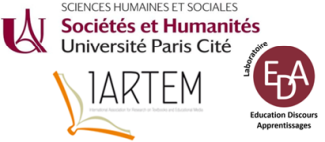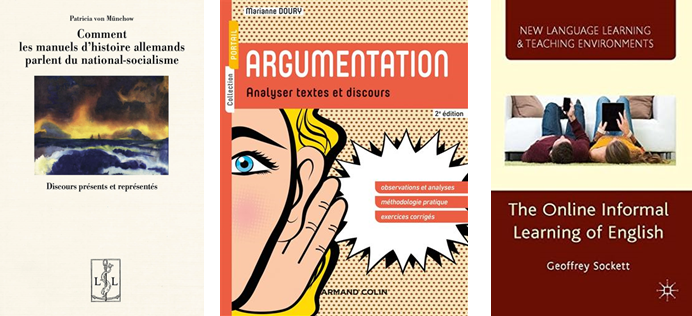|
|
|
Detailed program > Keynote 1Different linguistic approaches of textbooks and educational resourcesPatricia Von Münchow, Marianne Doury, Geoffrey Sockett (EDA research unit, University Paris Cité) A critical perspective on discursive coercion in history textbooksPatricia Von Münchow This paper is based on my theoretical and methodological work in French Discourse Analysis, on the one hand, and on a study on how National Socialism and World War II are treated in French and German history textbooks, on the other hand. The aim is to show how discourse-analytical tools can lead to a better understanding on how representations are constructed in textbooks and how their status within society is conveyed. The long-term aim I pursue within discourse analysis is to investigate “discursive cultures”, which can be defined by means of the discursive manifestations as well as the discursive construction of social representations that are circulating within communities of any kind concerning social objects, on the one hand, and the discourse to be held about these objects on the other hand (that is, what must, can and cannot be said about them and how it can and cannot be said). Textbooks, as being used by epistemic institutions, are especially important “objects” as well as agents “of social construction” (Guichard 2018, 322), but also objects and agents of discursive construction (which albeit being related to social construction does not coincide with it). Methodologically, the primary access to social representations through discursive representations are linguistic markers. However, one needs not only to grasp what exactly is said and how, but also what remains unsaid. Yet silence can only be observed indirectly. In an effort to conceive discursively relevant silences as well as their detection I established a comprehensive table linking analytical procedures to various levels of “presence” and “absence” in discourse, which are in turn linked to different levels of consensus or dissensus on representations within a community. Analyzing history textbooks by means of the table, which implies distinguishing what is said from what is not said, what is “little said” and what is, on the contrary, strongly stated, helps in turn to distinguish obvious, mandatory, sensitive and unacceptable social as well as discursive representations. In other words, it is a means to bring about what students are more or less forced to say, on the one hand, and what they are prohibited from saying, on the other hand, but also what they can choose to say or not and what they can say but without insisting and, finally, what they need not say because it is obvious. In this perspective I examined the chapters on National Socialism in four French and five German history textbooks. All of them are more or less recent books from major publishers and are still in use. The French textbooks are all for the ninth grade whereas the German publications can be used in either the ninth or the tenth grade, depending on the Land. All school types that exist in Germany at this level as well as several Länder are represented in the data set. In the paper I will first present the above-mentioned discourse analytical method and then show by means of examples from the data set how to detect different levels of presence and absence in discourse and what they mean in terms of the status of certain representations about National Socialism and World War II in Germany and in France. Finally, adopting a critical stance, I will insist on how exactly discursive coercion operates in textbooks, sometimes without the students or probably even the authors noticing it. Guichard, Sylvie. 2018. “War in Textbooks.” In Palgrave Handbook on Textbook Studies, edited by Eckhardt Fuchs and Annekatrin Bock, 317-28. New York: Palgrave Macmillan. von Münchow, Patricia. 2018. “Theoretical and methodological challenges in identifying meaningful absences in discourse.” In Exploring silence and absence in discourse. Empirical approaches, edited by Melani Schröter and Charlotte Taylor, 215-40. London: Palgrave Macmillan. von Münchow, Patricia (2023). Comment les manuels d'histoire allemands parlent du national-socialisme. Discours présents et représentés. Limoges : Lambert Lucas. How to deal with the values involved in argumentation? The treatment of argumentative texts in French textbooks (Grade 9)Marianne Doury The official regulations guiding middle school education focus on the question of values, which cuts across all subject areas; in particular, literary education is supposed to make a decisive contribution to students' access to values (Ahr, 2017). At the same time, these same texts (in particular, Bulletin officiel spécial n°11 du 26 Novembre 2015) consider argumentation to be an important skill targeted by the educational institution, particularly in the context of French lessons. This dual concern, for values on the one hand and argumentation on the other, is at the heart of my contribution. By drawing on these two threads, and attempting to see where they intersect, I will seek to shed new light on middle-school French textbooks. I'll focus on grade 9 French textbooks: indeed, "a more skillful use" of argumentation is an explicit objective for the end of low secondary school, with a view to upper secondary school and the French Brevet exam, which offers a choice of reflective or inventive writing (Bulletin officiel n° 30 du 26-7-2018). First, I propose to circumscribe the place given to argumentation in these textbooks, both in analysis and production. I will then seek to identify the way in which argumentative questioning is articulated with questions linked to values. Finally, I will propose a theoretical framing of argumentation (Plantin 2016; Jacquin & Micheli 2012) on the one hand, and of values in argumentation on the other (Guerrini 1999; Heinich 2017), which seems to me likely to further " secure " the approach to these two fields in middle school, and to guide the exploitation of the rich resources already present in the study texts present in these textbooks. Ahr, S. (2017). La sélection 2016 des "lectures pour les collégiens". Quelles valeurs ? Quelles postures de lecture ? Le Français aujourd'hui(197), 37-50. Guerrini, J.-C. (1999). Valorisation, valeurs et argumentation. Dans J.-C. Guerrini, & E. Majcherczak, L'argumentation au pluriel. Polyphonie, valeurs, points de vue (pp. 39-92). Lyon: PUL (série Travaux et documents). Heinich, N. (2019). Définir la valeur d'un point de vue sociologique. Recherches & Travaux(94). doi:https://doi.org/10.4000/recherchestravaux Jacquin, J., & Micheli, R. (2012). Entre texte et interaction : propositions méthodologiques pour une approche discursive de l'argumentation en sciences du langage. Dans Collectif, SHS Web of Conferences vol.1, 3e Congrès Mondial de Linguistique Française (pp. 599-611). Plantin, C. (2016). Dictionnaire de l'argumentation. Une introduction aux études d'argumentation. Lyon: ENS Editions.
Rewilding language learning resources in higher educationGeoffrey Sockett With the advent of ubiquitous access to online contents in English, teachers of non-specialist English classes in higher education face the challenge to create materials which remain relevant to today's learners. Indeed 15 years of research into informal digital learning of English (Dressman & Sadler 2019, Toffoli et al, 2023) indicates that, in terms of hours, out-of-class informal English activities, such as viewing vlogs and series, social networking and gaming in English, frequently dwarf the number of hours of contact time for the language requirement of students specializing in disciplines other than English. For example, while online informal activities often account for several hundred hours per year, non-specialist students in French universities are typically offered between 15 and 48 hours of English classes per year. The term “wilds” has been used by Sauro and Zourou (2019) and others to refer to online materials and interactions not designed for language learning, while “rewilding” was applied to language teaching and learning by Thorne et al (2021) and indicates an ecological approach to language teaching and learning which acknowledges the interaction between in-class and out-of-class activities in the complex dynamic system of second language development. Given this context in which learners are developing skills in English outside the classroom, action research into how to make the few hours of classroom learning relevant has been one of the areas of interest to researchers in the field of informal digital learning of English (Moffat, 2022). The issues of how to best engage with informal learning in the setting of non-specialist language provision within the French higher education system therefore need to be addressed on a case by case basis. The specific aim of this paper is to present findings on the implementation of English teaching materials for undergraduate Language Sciences students, designed to replicate learner activities outside the classroom and thus reduce the perceived distance between formal and informal language practices. The paper includes a discussion of the design, implementation and assessment of language learning materials based on the most frequently reported informal learner activities, such as listening to music, watching videos and social networking in English. It will also analyse the chacteristics of such materials compatible with an “English for Specific purposes” focus in Language Sciences. The learning materials used in this process include vlogs made by humanities students in English speaking countries, professional fiction, such as films set in specific professional contexts and more academic documents on the same themes. Tasks undertaken by students include the production of videos in the style of the vlogs discussing their academic work and student life. After a brief analysis of the design process relating to the contents with reference to existing scholarship on rewilding and informal language learning the paper will then analyse questionnaire data from learners exposed to these materials. This involves essentially qualitative analysis of responses to open questions as well as some descriptive quantitative analysis of reports of learner practices online outside the classroom. The methodological steps undertaken are as follows: design and implementation of learning materials for undergraduate Language Sciences students, design of a questionnaire to elicit data from learners, analysis of data from learner questionnaires to evaluate learner engagement with the materials. Preliminary results indicate that learners see the activities used in these classes as helpful both in terms of classroom learning and as a catalyst to harness the language learning affordances of out-of-class activities. Hence rewilding the classroom is not simply a matter of putting learners' out-of-class activities to good use in the classroom, but of putting classroom time to good use to enhance learner engagement with the range of out-of-class activities which will be part of their daily lives for the many decades beyond their time in formal education. Dressman, Mark, and Randall William Sadler, editors. The Handbook of Informal Language Learning. 1st ed., Wiley, 2019, https://doi.org/10.1002/9781119472384 Moffat, Andrew D. Second Language Use Online and Its Integration in Formal Language Learning: From Chatroom to Classroom. Multilingual Matters, 2022. Sauro, Shannon, and Katerina Zourou. What Are the Digital Wilds? no. 1, Feb. 2019, pp. 1–7, http://scholarspace.manoa.hawaii.edu/handle/10125/44666 Thorne, Steven L., et al. “Rewilding Language Education: Emergent Assemblages and Entangled Actions.” The Modern Language Journal, vol. 105, no. S1, 2021, pp. 106–25, https://doi.org/10.1111/modl.12687 Toffoli, Denyze, et al., editors. Language Learning and Leisure: Informal Language Learning in the Digital Age. De Gruyter, 2023, https://doi.org/10.1515/9783110752441
|



